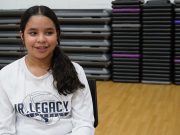On a summer day in Drohobycz, Poland in 1942, 13-year-old Bernard Mayer nearly fell victim to one of the biggest tragedies of the 20th century. Nazis stormed the town, rounding up the entire Jewish population, some 17,000 strong, and forcing them into a ghetto.
Mayer and his family – his parents, his two brothers and sister – were just some of the thousands forced into the ghetto, a collection of homes separated from others. Over time, most of its residents were carried off to concentration camps to die.
“We saw everything,” said Mayer. “It was the hunt for all Jews. My whole family was taken from me…just everyone.”
Now 96 years old, Mayer can still recall every moment of the holocaust that he experienced as a child. Then there was the family’s 18 months in an underground bunker, liberation, time in France, New York and Miami, where he arrived in 1975. He published a book “Entombed: My True Story: How 45 Jews Lived Underground and Survived the Holocaust” in 1996 and has told his story of surviving a traumatic event in the midst of one of history’s greatest atrocities.
As of now only 66,000 survivors are left in the world including fewer than 5,000 in Florida.
Mayer was born on December 30, 1926 to his mother, Tonia, and father, Issac. “I grew up as the youngest in my family with two brothers and sisters,” said Mayer. “I remember getting all the attention from my siblings and how happy we were.”
Issac died when he was only nine years old and Mayer raised with a mother who took much care of her son. ”My mother did everything to make sure I was doing well after my father died,” said Mayer.
However, his family and life came to a halt when the Germans began to invade Europe in 1941, including his own town in Drohobycz. “It was taken over and everything changed,” said Mayer. “We had to go to Labor Camps and had to wear a white armband to show I was Jewish, a sign of things to come.”
On November 19, 1942, things took a major turn in the ghetto as the Nazis entered to hunt for Jews, It was known as “Bloody Thursday.”
The action lasted a week with everyone staying indoors as the Germans killed virtually every Jew in sight. “We knew that the inevitable was going to happen in the ghetto”, said Mayer. “My brother, Jakob, in plain sight saw the Gestapo shoot the Jews as they killed them on the ground.”
Bernard and his family needed to hide and they did in their home. “Every apartment in the ghetto had bare walls, yet we had a closet,” said Mayer. “We got a rack installed inside the closet with all our clothes, while we pushed ourselves to the back and hid.”
They eventually survived the week-long action with only a few thousand Jews that remained alive in the ghetto.
The family remained in the ghetto with Mayer, who was left with his mother, Tonia, and his brother, Jacob, were left with no place to go, left in desperation. “After most of the jews were taken away in the ghetto, it was only a matter of time before the ghetto was going to be liquidated by the Germans,” said Mayer.
Bernard and his family initially decided to leave the ghetto to hide in a barrack, a building to house soldiers. However after being told it will be a couple of months till the Germans return to the ghetto, they knew a miracle had to happen for their own survival.
In January 1943, a month after attempting to leave the ghetto, Tonia, who was scared to leave the house where she was hiding, knew the family needed groceries and went to the only store left in the ghetto. “My mother asked a woman in the store if there was any place to hide, and the woman whispered that a young man was offering to use his house for safety,” said Mayer. That is when they met two men who ultimately were considered miracles.
Mayer and his family were aided by Aron Shapiro, a friend of Mayer who was an architect, and Ivon Bur, a Ukrainian Catholic. Shapiro designed and constructed a 10-by-30 foot bunker underneath Bur’s home complete with electricity, water tanks as well as a working stove and toilet.
“Ivan was so impactful in us surviving, allowing us to use his home, he saved our lives,” said Mayer. “At the time, all we thought about was surviving. Looking back, these two were a miracle for us.”
Yet the only question was how were they going to build a bunker in a short time without getting caught. “The plan was for my brother, Shapiro, Bur, and two other Jewish men to work on the bunker”, said Mayer. “Each had a responsibility with one on the lookout, making sure no one is watching them, while the four others helped build the bunk.”
The building of the bunker began toward the end of January of 1943, finishing months later in April with full completion, beginning the arrival of others to join for their safety.
“Once my family and I arrived at the bunker, we knew immediately there was no timetable and how long we would be there,” said Mayer. “It became extremely tough for the first few days thinking about my loved ones already dead including my sister and other brother knowing they could also be here.”
Mayer and his family were among the 45 Jews hiding in that bunker, which was originally built for only 16. They lived on oats and barley while the war raged on.
“Every day was slow and scary, but we knew one day of surviving was a blessing for us,” said Mayer. “In the bunker, we had a map and radio to determine how far the Russians were from coming to save us.”
They had weekly routines as Bur would send imitation coffee, toilet paper, barely, and sometimes bread if there was supplies. “Ivan did a lot for us, was our only true source to get food, while also telling us current news about what was happening in the ghetto.”
The 45 Jews kept themselves busy with daily prayer, chess, and even the comfort of conversation. “In a dark time, we found ways to smile, while also not thinking of the current event going on right in front of us,” said Mayer.
Death was a constant threat in these conditions, and came very close one winter day in December of 1943, when the Nazis, suspicious of Bur’s activities, came knocking at his door. They dug through his cellar, only to give up after a few feet of digging.
“This incident was very terrifying,” said Mayer. “None of us moved at all, and knew that our lives might have ended. The Nazis were only five feet away from the bunker.”
Eight months later, liberation came by way of the Russian army. Mayer and the others emerged into the light in August of 1944.
“On the morning of liberation, I vividly remember being exhausted. Having to eat barley for a year and the heat from being stuck inside the bunker got to us,” said Mayer.
Using the radio, they detected the Russians were approaching their area and got their freedom.
“I remember it being a peculiar day,” said Mayer. “Everyone dreamed in the bunker that liberation was going to be so freeing and happy, yet was not the case because we felt very weak and drained from the experience.”
Mayer and his family knew that their life was going to change for the better, and it did as freedom came their way.
His youngest son, Eric Mayer, was astonished to hear his story and is grateful. “When I was old enough to understand what he had gone through and …his personal story of survival, I got so emotional,” he said.
Mayer and his family moved to France after the war, and then to the United States in1954. He earned a degree in economics from New York University this year and then opened several women’s apparel stores. He got married and had two kids, and moved to North Miami Beach in 1975.
In 1991, he got a master’s degree in social work from Barry University. Mayer went to numerous nursing homes and shared his story, then listened to his audiences’ reactions. “Coming to the United States, I have been an entrepreneur, yet I always had a passion to help others and social work gave me that avenue.”
Alan Mayer, the oldest son of Bernard read what his father had gone through and understood his roots. “He has so much perseverance in him and showed never to give up in any situation,” said Alan. “It is such an honor to be the son of the most passionate person I have ever met.”
Bernard’s story of surviving in a traumatic event for over a year is a true definition of a champion. “I have been through many trials and tribulations in my life,” he says. “But I can truly say that the bunker made me the strong person that I am today.”


































